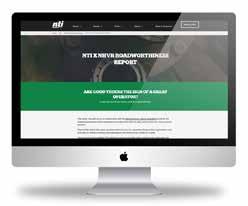News
New report proves good vehicle maintenance improves road safety
A
new report from Australia’s largest trucking insurer and the industry regulator has confirmed operators who effectively maintain their vehicles are less likely to be involved in an incident. For the first time, the trucking industry regulator and leading insurer have shared de-identified critical road crash data, with the aim of improving road safety. The National Heavy Vehicle Regulator and Australia’s leading trucking insurer, NTI, have brought together their research, to minimise risk and create safer workplaces for truck drivers. Data from NTI’s NTARC Major Accident Investigation Report and the NHVR’s National Roadworthiness Baseline Survey was examined to create a new report which looks at the relationship between vehicle standards and safety performance. Traditionally, there has been very little evidence which proves a link between vehicle maintenance and major incidents due to a separation between organisations which hold data on vehicle condition and those who have access to crash data. This initiative between NHVR and NTI is an important step forward in sharing insights. Ten key areas were examined in the report, including brakes, couplings, steering and suspension, wheels and tyres, structure, seats, lights, mirrors, windscreens, and engine and driveline to determine there was a correlation between poor maintenance and increased claims frequency and cost. Report author, NTI’s Transport & Logistics Risk Engineer Adam Gibson, said the link was particularly clear in two categories. “There was a 29% increase in frequency and a 22% increase in the cost of claims for transport companies with poorly maintained couplings. For wheel and tyre defects, the frequency was 32% higher than the baseline while cost was 26% higher,” Mr Gibson said. “It’s important to note this does not show crashes were caused by defects in 6
WATM • May 2021
those systems, but that operators with trucks in which couplings, wheels and tyres were not well maintained, were involved in a greater number of claims. The link is correlative, not causative.” Mr Gibson said there was one category that yielded surprising results. “There was only a 3% higher frequency and 4% higher cost compared to the baseline for operators who had vehicles with defects in their braking system. This is due to the way braking systems were tested back in 2016, and that process has now undergone a significant overhaul.” NHVR Director Vehicle Safety and Performance Peter Austin said this report highlighted the importance of regular and effective maintenance regimes across the heavy vehicle fleet. “Well maintained vehicles operating on our road network are essential to the safety
of all road users,” Mr Austin said. “The NHVR has a long-standing commitment to evidence-based enforcement, which is why we take a national, risk-based approach to checking whether heavy vehicles in the fleet are maintained. “If we see a history of non-compliance, we intervene early and investigate further to prevent a potential accident from occurring. “The report marks an important step forward, with the expertise and insights shared across the regulator and insurer providing opportunities to reduce fatalities on our roads.” The new report comes just months after NTI was named a recipient of the NHVR’s 2020 Heavy Vehicle Safety Initiative, a grant supported by the Federal Government. The full report can be viewed at www.nti.com. au/brands/nti/risk-management-services/ roadworthiness-report
TRANSPORT BOSS CONVICTED OF SPEED LIMITER TAMPERING
T
he owner of a South Australian transport company has been prosecuted by the National Heavy Vehicle Regulator (NHVR) for possessing speed limiter tampering equipment. South Australia Police (SAPOL) Heavy Vehicle Investigation Section conducted an investigation at the company’s premises in August 2020 and located a laptop installed with tampering software, as well as connecting plugs. The company owner initially declined to answer questions about the device, but pleaded guilty to possessing a speed limiter tampering device when he appeared at Adelaide
Magistrates Court. Speed limiters ensure that specified trucks over 12-15 tonnes cannot travel above the national 100kmh limit for such vehicles. NHVR Executive Director of Statutory Compliance Ray Hassall said speed limiter tampering was a serious offence. “The NHVR and SAPOL regard speed limiter tampering as a serious public safety offence and we won’t hesitate to prosecute operators who ignore the law.” Under the Heavy Vehicle National Law it is an offence to possess a speed limiter tampering device without a reasonable excuse.














